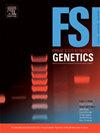theta校正对兄弟姐妹检验的影响
IF 3.1
2区 医学
Q2 GENETICS & HEREDITY
引用次数: 0
摘要
遗传关系测试依赖于适当的人口数据,在过去的三十年中,为此已经投入了大量的努力。这可以通过大量的群体遗传研究得到证明,这些研究提供了世界范围内广泛人群的短串联重复序列(STR)数据。然而,在不同地理水平上对种群子结构的测量及其对亲缘关系检测的影响的研究相对较少。在亲属关系计算中,群体子结构的概念被用作共同祖先的代理,并经常通过引入共同祖先系数θ (θ)来纠正。实际上,经常在国家一级或对整个亚种群进行评估。然而,基础设施、地理和社会文化因素有可能对地方一级的共同祖先估计产生重大影响,导致较小的地方社区的人口子结构较大,这可能无法通过大规模人口研究充分解决。因此,对于一个特定的遗传关系测试案例,准确地估计共同祖先的适当程度是具有挑战性的。与法医学中DNA匹配概率的计算相反,没有保守的方法来解释遗传亲属关系测试中的这种不确定性。在本文中,我们证明了共同祖先的theta校正因子的错误选择会对计算结果产生重大影响,因此可能对有关个体的生活产生潜在影响。这项研究的结果已被用来制定关于结果交流的建议,特别侧重于个人卷入国家当局面临的行政或法律诉讼的案件,例如移民案件。本文章由计算机程序翻译,如有差异,请以英文原文为准。
Impact of theta correction in siblingship testing
Genetic relationship testing is dependent on appropriate population data, for which there has been a considerable amount of effort invested over the past three decades. This can be evidenced by the large number of population genetic studies that have presented short tandem repeat (STR) data for a wide range of population groups worldwide. However, comparatively little effort has been invested in the measurement of population substructure at various geographical levels and in the investigation of its effect on genetic relationship testing. The concept of population substructure is utilized as a proxy for co-ancestry in kinship calculations and is often corrected for by introducing the co-ancestry coefficient theta (θ). In practice, it is frequently assessed at the national level or for entire subpopulations. However, infrastructure, geographic and sociocultural factors have the potential to significantly impact the estimation of co-ancestry at the local level, leading to larger population substructure in smaller local communities, which may not be adequately addressed by large-scale population studies. Consequently, it can be challenging to accurately estimate the appropriate degree of co-ancestry for a specific genetic relationship testing case. In contrast to the calculations of DNA match probabilities in forensics, there is no conservative approach to account for this uncertainty in genetic kinship testing. In the present paper, we demonstrate that the incorrect choice of the theta correction factor for co-ancestry can have a substantial impact on the outcome of the calculations and therefore potentially on the life of the concerned individuals. The findings of this study have been used to formulate recommendations for the communication of results, with a particular focus on cases where private individuals are involved in administrative or legal proceedings facing state authorities, such as immigration cases.
求助全文
通过发布文献求助,成功后即可免费获取论文全文。
去求助
来源期刊
CiteScore
7.50
自引率
32.30%
发文量
132
审稿时长
11.3 weeks
期刊介绍:
Forensic Science International: Genetics is the premier journal in the field of Forensic Genetics. This branch of Forensic Science can be defined as the application of genetics to human and non-human material (in the sense of a science with the purpose of studying inherited characteristics for the analysis of inter- and intra-specific variations in populations) for the resolution of legal conflicts.
The scope of the journal includes:
Forensic applications of human polymorphism.
Testing of paternity and other family relationships, immigration cases, typing of biological stains and tissues from criminal casework, identification of human remains by DNA testing methodologies.
Description of human polymorphisms of forensic interest, with special interest in DNA polymorphisms.
Autosomal DNA polymorphisms, mini- and microsatellites (or short tandem repeats, STRs), single nucleotide polymorphisms (SNPs), X and Y chromosome polymorphisms, mtDNA polymorphisms, and any other type of DNA variation with potential forensic applications.
Non-human DNA polymorphisms for crime scene investigation.
Population genetics of human polymorphisms of forensic interest.
Population data, especially from DNA polymorphisms of interest for the solution of forensic problems.
DNA typing methodologies and strategies.
Biostatistical methods in forensic genetics.
Evaluation of DNA evidence in forensic problems (such as paternity or immigration cases, criminal casework, identification), classical and new statistical approaches.
Standards in forensic genetics.
Recommendations of regulatory bodies concerning methods, markers, interpretation or strategies or proposals for procedural or technical standards.
Quality control.
Quality control and quality assurance strategies, proficiency testing for DNA typing methodologies.
Criminal DNA databases.
Technical, legal and statistical issues.
General ethical and legal issues related to forensic genetics.

 求助内容:
求助内容: 应助结果提醒方式:
应助结果提醒方式:


